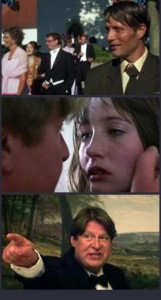By: debbie lynn elias
Debuting at the AFI Film Festival in November and then garnering an Oscar nomination as Denmark’s entry for Best Foreign Language Film, director/writer Susanne Bier re-teams with writer Anders Thomas Jensen to bring us AFTER THE WEDDING, a follow-up to her well-received Sundance winning drama “Brothers”.
 With her now patented brand of visual excellence, Bier brings us the well crafted story of Jacob. A Danish ex-patriot, he now runs an orphanage in Bombay, India where he has developed a special fondness for one little boy, Pramod. With no money to continue his good works either with the orphanage or Pramod, Jacob is forced back home to try and secure funds to keep the orphanage going. Once home, he meets the well-to-do and bankrolled Jorgen who is keen to make a healthy investment to Jacob and his good works.
With her now patented brand of visual excellence, Bier brings us the well crafted story of Jacob. A Danish ex-patriot, he now runs an orphanage in Bombay, India where he has developed a special fondness for one little boy, Pramod. With no money to continue his good works either with the orphanage or Pramod, Jacob is forced back home to try and secure funds to keep the orphanage going. Once home, he meets the well-to-do and bankrolled Jorgen who is keen to make a healthy investment to Jacob and his good works.
Although Jorgen seems disinterested in Jacob’s endeavors, but still willing to invest, he nevertheless invites Jacob to his daughter’s wedding the following day. Secrets and lies bubble to the surface as the festivities begin, particularly when Jacob meets Jorgen’s wife Helena, supposedly for the first time. But surprise. At the wedding, Jacob discovers that Helena is, in fact a former love whom he left some 20 years ago in India. And not one to be a spoiler, all I can say is as to be expected in a Bier film, things aren’t quite what they seem and a potentially destructive clarity rings true during a toast by the bride at her own wedding.
From its stunning visuals to rich performances from Mads Mikkelsen as the beleaguered Jacob and Rolf Lassgard’s pompous turn as Jorgen, the film is both sensitive and powerful. Character driven, Mikkelsen, Denmark’s brightest star, is flawlessly resolute as Jacob with an almost Pacinoesque quality. Having recently done battle with James Bond in “Casino Royale”, Mikkelson bears not only a striking resemblance to Viggo Mortensen physically, but also in his intensity and charismatic appeal. As Helena, Sidse Babett Knudsen brings a tangible reality to the project adding to the suspense and melodrama of the story.
In what is undoubtedly the best work of Bier and Jensen out of their three projects to date, the script is tightly written and emotionally impactful. Thriving on thematic paranoia with almost Biblical undertones, Bier and Jensen masterfully manipulate their characters and the audience with slick shrewdness. With her own patented visual subtleties and deftly crafted three act structuring, Bier makes every shot count with innovative twists and turns that parallel the script itself. Complimenting her vision is the editing of Pernille Bech Christensen and Morton Hojbjerg. Perhaps the one downfall of the film, however, is the endless plot developments which are so extensive as to lose some of the emotional connection with the characters by film’s end.
Building momentum from start to finish, the story scratches deep below the surface of the characters and their relationships, forging an unseen strength that translates to the audience. Reminiscent of Ingmar Bergman with its substantive style, AFTER THE WEDDING provides a focused perspective of life.












